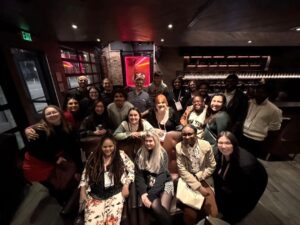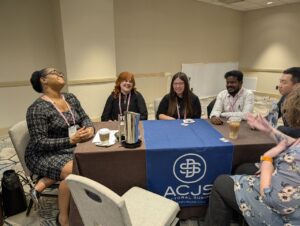The knowledge scholars bring back can contribute to policy discussions, improve research quality, and enhance the state's reputation in academia.
Published Mar 22, 2025 | 2:13 PM ⚊ Updated Mar 22, 2025 | 2:13 PM

Thomas Gowthaman P (left) and Vigneshwaran Venkatesan at the ACJS Summit - 2025.
Synopsis: Social Science scholars attending international knowledge summits abroad are compelled to pay the airfare from their pockets, which makes many opt out of such events. A change is necessary to support them, so they can enrich the state and the country with the knowledge they acquire, besides presenting their views on global platforms.
Earlier this month, I attended the Academy of Criminal Justice Sciences (ACJS) Doctoral Summit in Denver, USA, along with Thomas Gowthaman P, another PhD scholar from the University of Madras.
Selected from over 100 applicants—mostly from American universities—we had the honour of representing Tamil Nadu on a global academic platform.
However, despite our achievements, our journey to Denver highlighted a significant problem: a lack of financial support for Indian scholars, particularly in social sciences, to attend international conferences.
ACJS covered our registration, stay, and food, but travel expenses were our responsibility. With no financial assistance from the University of Madras, we had to fund our flights by ourselves.

In the US, every university provides travel grants to their research scholars, ensuring that financial barriers do not prevent participation in global academic events.
This financial burden is unfair, especially given that the university once provided travel grants for international conferences. Until 2019, scholars at the University of Madras were given partial support for their international travel.
However, due to shifting budget priorities and administrative constraints, these grants have disappeared, forcing students to either crowdfund or forgo international academic exposure.
One might wonder why ACJS, a well-established academic society, did not cover travel expenses. The reason is simple: in the US, every university provides travel grants to their research scholars, ensuring that financial barriers do not prevent participation in global academic events.
On average, US universities offer around $800 a year to cover travel and per diem costs, without any disparity between STEM (Science, Technology, Engineering, and Mathematics) and social science scholars. Due to this system, ACJS and similar academic organisations assume that scholars will have institutional support for travel, a privilege Indian researchers do not enjoy.
The disparity in funding between STEM and social sciences is another concern.

International conferences provide exposure to new research methods, networking opportunities with global experts, and avenues for future collaboration. (X)
While STEM researchers have access to multiple grants, travel support, and industry sponsorships, social science scholars often struggle for financial aid. This is even though disciplines like criminology, sociology, and public policy play a crucial role in shaping governance, law enforcement, and social justice.
International conferences are more than just academic gatherings; they provide exposure to new research methods, networking opportunities with global experts, and avenues for future collaboration.
They help place Tamil Nadu’s research community on the world stage. Without institutional support, however, participation remains a privilege only for those who can afford it.
If Tamil Nadu aspires to be a hub for research and higher education, it must invest in its scholars. The state government should:
When we attend global academic forums, we do so not just as individuals but as representatives of our state and country. The knowledge we bring back can contribute to policy discussions, improve research quality, and enhance the state’s reputation in academia.
But without financial support, many deserving scholars will be left behind, unable to share their work with the world. Investing in international academic engagement is not an expense—it is an investment in knowledge, innovation, and Tamil Nadu’s future.
The government must act now to ensure that no scholar has to choose between financial stability and academic excellence.
(Vigneshwaran Venkatesan is a PhD scholar at the University of Madras. Views are personal. Edited by Majnu Babu).
